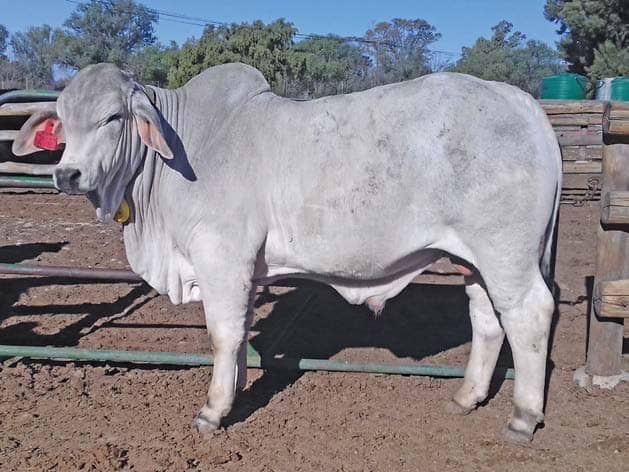How Non-Genetic Factors Affect Bull Performance
Farmer's Weekly
|November 6, 2020
An Agricultural Research Council study of the performance of Brahman bulls in feedlots across South Africa has highlighted the non-genetic traits, such as environment and herd of origin, that affect the average daily gain and feed conversion ratios of the animals. Researchers Melville Ferreira, Alfredo Lepori and Frans Jordaan explore the importance of the results, emphasising that maximum feed efficiency is essential for the long-term sustainability and profitability of the beef industry.

The world’s growing human population has resulted in an increased demand for protein, and sustainable beef production is key to meeting this demand in the long term. But with natural resources under pressure, beef producers are being compelled to produce more from less. The combination of decreasing hectares available for crop production increased utilisation of grain for fuel, and an increase in input and feed costs are some of the key factors that highlight the changing dynamics of agriculture.
Feed amounts to between 55% and 70% of a livestock concern’s total production cost, so a 10% improvement in animals’ feed efficiency can result in a saving of several hundred million rands per annum for the industry as a whole. Moreover, measuring efficiency may result in decisions that increase productivity without increasing the cost of production, resulting in greater profit margins.

THE IMPORTANCE OF FEED EFFICIENCY
Feedlot studies in the US demonstrated that a 10% improvement in average daily gain (ADG) as a result of a 7% increase in appetite improved profitability 18%, whereas a 10% improvement in feed efficiency returned a 43% increase in profits. By improving feed efficiency, farmers contribute to a more sustainable and profitable production system.
このストーリーは、Farmer's Weekly の November 6, 2020 版からのものです。
Magzter GOLD を購読すると、厳選された何千ものプレミアム記事や、10,000 以上の雑誌や新聞にアクセスできます。
すでに購読者ですか? サインイン
Farmer's Weekly からのその他のストーリー
Farmer's Weekly
Infrastructure, policy, and finance will be the African continent's growth drivers
Africa's agricultural potential is vast, but inefficiencies in infrastructure, trade policy, and finance limit growth. Investments in transport, cold storage, irrigation, and digital trade systems, among others, are key to unlocking faster, cheaper, and more efficient agricultural trade.
3 mins
January 2-9, 2026

Farmer's Weekly
SAPPO Academy showcases skills development and small business success
The South African Pork Producers' Organisation (SAPPO) Academy, a training organisation that promotes animal, environmental, and public health in the pig industry through knowledge transfer, recently hosted a mini development symposium in Pretoria. The event included an afternoon of meaningful dialogue, strategic learning, and leadership exchange, effectively bridging academic insight with real-world industry innovation.
3 mins
January 2-9, 2026

Farmer's Weekly
Backing for SA Canegrowers as sugar imports soar
Coenie Snyman, winemaker and founder of Rock of Eye Wines, was named the 2025 Diners Club Winemaker of the Year for his Rock of Eye Cabernet Sauvignon 2022, while Marnich Aucamp, assistant winemaker at Stellenbosch Vineyards, won the Young Winemaker of the Year award for his Stellenbosch Vineyards Credo Chenin Blanc 2024 at a gala dinner near Kleinmond in the Western Cape.
1 mins
January 2-9, 2026

Farmer's Weekly
New or used? A practical guide to second-hand farm equipment
Second-hand farm machinery can deliver excellent value, if you know what to look for. Western Cape equipment broker Debbie Smit gave Lindi Botha practical advice to help farmers decide when to buy new, when pre-owned is the smarter choice, and how to avoid the costly pitfalls that often catch buyers off-guard.
4 mins
January 2-9, 2026

Farmer's Weekly
The story of the Drakensberger beef cattle breed's evolution in Africa
The Drakensberger cattle breed has been part of the South African landscape for ages. So-called black indigenous cattle existed in South Africa as early as the 15th and 16th centuries and formed the foundation of the current Drakensberger beef cattle breed.
4 mins
January 2-9, 2026

Farmer's Weekly
Man vs machine - which works best in SA's farming sector?
South African farmers have embraced both mechanisation and staffing solutions to improve farm level efficiency. Sabrina Dean investigated the pros and cons of both and filed this report.
9 mins
January 2-9, 2026
Farmer's Weekly
SA's poultry industry must be more inclusive and sustainable
In spite of great progress made over the past 30 years in South Africa's poultry value chain, setbacks such as avian influenza and trade restrictions are calling for official intervention
2 mins
January 2-9, 2026

Farmer's Weekly
An introduction to forward contracts and commodity futures for South African farmers
The agriculture sector is notoriously volatile, but producers can find stability using financial derivative tools. This article clearly defines and differentiates between two key instruments: forward contracts and futures contracts.
3 mins
January 2-9, 2026
Farmer's Weekly
Less tillage, more life: the machines and techniques behind soil recovery
Soil health is the foundation of global food security, environmental quality, and agricultural sustainability. According to expert Dr Hendrik Smith, reversing the cycle of soil degradation requires the continuous application of regenerative conservation agriculture principles, with no-tillage cultivation being nonnegotiable.
4 mins
January 2-9, 2026

Farmer's Weekly
Five Joburg hotels that make business a pleasure
Even with its well-documented problems, Johannesburg remains the centre of business in South Africa. And unlike some cities with their mountains and oceans, you'll get value and quality for a fraction of the price at these hotels. There are also great views in the mix. By .
6 mins
January 2-9, 2026
Translate
Change font size

